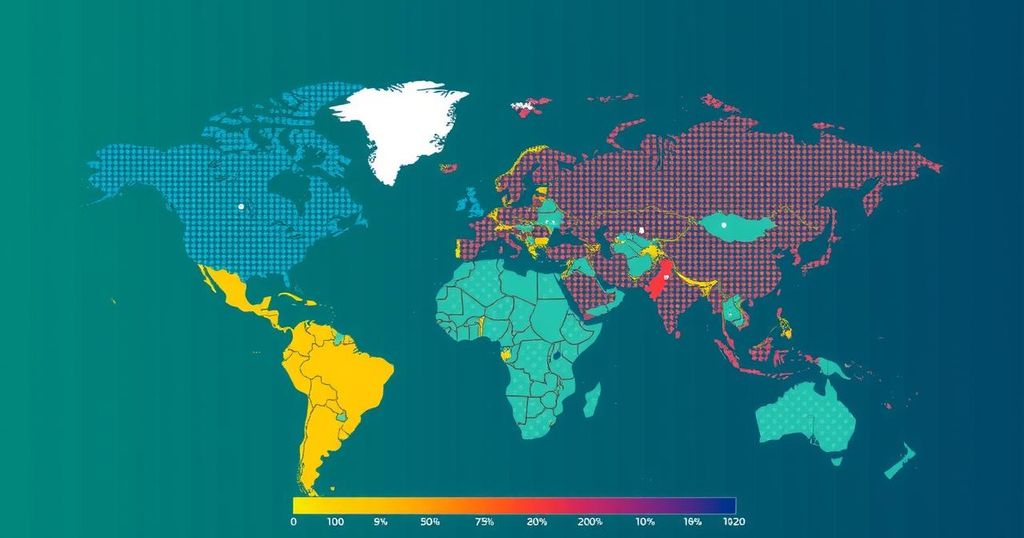Global Climate Commitment Weakens Amid Unprecedented Election Year
The unprecedented election year of 2024 highlights a declining commitment to climate action worldwide. Despite facing numerous environmental disasters, political outcomes across major economies demonstrate a shift in focus away from urgent climate policies. The rise of populist leaders and electoral victories for climate skeptics indicates a troubling trend amidst ongoing climate crises, as the pressing need for action remains largely sidelined in public discourse.
An election year of unprecedented scope has drawn attention to a troubling trend concerning global climate commitments. With nearly half of the world’s populace preparing to vote in 2024, there is a palpable decline in proactive climate policies, even amidst escalating environmental crises. Notably, major wins for climate skeptics, such as Donald Trump, emphasize this regression. Experts, like Catherine Fieschi, highlight that climate issues have become secondary, overshadowed by inflation, geopolitical disruptions, and populist political narratives.
Historically, the climate agenda peaked about five years ago, characterized by vibrant activism led by individuals such as Greta Thunberg. However, recent events – including the pandemic and geopolitical tensions – have driven climate discussions off the public agenda. As Fieschi noted, the current political discourse has shifted focus from green policies to clean energy initiatives, with former existential threats now being perceived as budgetary burdens.
This year, projected to be the hottest on record, has seen climate become a peripheral topic in many elections. The exceptions are notable; in India, severe weather has catalyzed farmer protests that influenced electoral outcomes, yet this has not translated into a stronger global commitment to climate action. In Europe, right-wing factions that downplay climate action have made surprising electoral gains, paralleled in the U.S. by Trump’s successful campaign against environmental standards.
Interestingly, not all territories reflect this pessimistic trend. Labour’s significant victory in the UK framed clean energy as a central platform, while in France, far-right advances faced defeat. Despite these instances of progress, the consensus indicates a weakening of global resolve to address climate challenges, even as scientific warnings continue to escalate regarding climate targets and emissions.
Regrettably, the recent Cop29 climate summit in Azerbaijan further exemplified this regression. Attended predominantly by authoritarian regimes, the summit saw little progress on critical climate finance issues and continued defiance from host leadership regarding fossil fuel reliance. Activists like Gerry Arances voiced concerns about the apparent stagnation in global climate action amid declining commitments from major polluters. Edi Rama, Albania’s prime minister, succinctly questioned the purpose of such gatherings in light of ongoing environmental degradation and inaction.
The current global political climate is marked by numerous significant elections which have inadvertently shifted the focus away from the pressing need for climate action. Major political figures, many of whom are skeptical of climate science, have gained traction, influencing public discourse on the importance of climate initiatives. This situation is exacerbated by immediate concerns such as inflation, geopolitical instability from conflicts like the war in Ukraine and the Israel-Gaza situation, and a rising skepticism toward previously prioritized climate agendas, emphasizing the need for a thorough understanding of these dynamics in assessing environmental policies.
In summary, the 2024 election year represents a critical juncture for global climate commitments, with an observable decline in prioritization amidst rising environmental challenges. The growing influence of populist figures and right-wing parties underscores a shift in political focus from climate urgency to economic concerns. This year’s events, including the troubling outcomes of the Cop29 summit, reflect an unsettling trajectory that, if unaddressed, may impede significant progress in mitigating climate impacts, thus warranting urgent attention from leaders and the public alike.
Original Source: www.theguardian.com




Post Comment